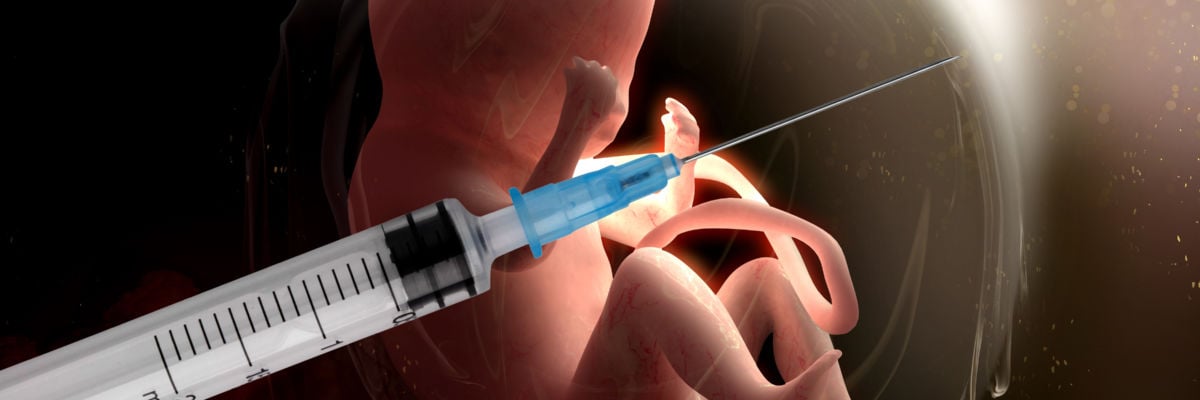
This is part one of a point-counterpoint regarding the morality of Catholics’ receiving the currently available COVID-19 vaccines. Stacy Trasancos provides a counterpoint here.
Catholics and pro-lifers are being forced to make a difficult discernment in conscience with regard to taking or refusing to use the currently available COVID-19 vaccines, because no completely unproblematic ethical vaccines are available to them.
The Church has identified and condemned a serious problem: the use of biological material of illicit origin—that is, cell lines derived from the bodies of aborted children—in the design, manufacture, and confirmatory testing of the recently approved COVID vaccines and some older vaccines. The Congregation for the Doctrine of the Faith (CDF) unequivocally condemned any scientific research involving these tissues or cells that were obtained immorally in the instruction Dignitatis personae from 2008.
That issue is not in doubt, but a more complicated problem arises when we are no longer talking about scientists doing research, but end users of vaccines who, by benefitting from the vaccines, are in a situation of material cooperation with the evil actions of others. There would be no real moral quandary if ethical and effective COVID vaccines with no connection to abortion existed. In that case, the moral choice would be clear: people who wish to be vaccinated must take the ethically produced vaccine. But our current situation presents the dilemma of whether individuals should accept and use ethically problematic vaccines that are the only vaccines licensed for use at this time.
One of the most intricate areas of moral theology concerns determining what level of cooperation with evil is allowable. It is always immoral to formally cooperate with evil by sharing the bad intention of the main actor. Material cooperation occurs when the cooperator does not share the bad intention of the evildoers but nevertheless willingly does something that assists them. The Church has consistently condemned close, or immediate, material cooperation—defined as actions that are essential to the accomplishment of the evil action. Much more complicated is remote material cooperation with evil. Such cooperation can, in some circumstances, be tolerated if legitimate, proportionate goods are sought. According to the CDF, the United States Conference of Catholic Bishops, and The National Catholic Bioethics Center (NCBC), with the current COVID vaccines Catholics are faced with a problem of remote, passive, material cooperation with abortion.
Catholics and all moral people strive to do good and avoid evil. It is a sad fact in our fallen world, however, that some forms of remote material cooperation with evil are very hard to avoid. A good example is paying taxes. There is near certitude that some of the money will go to evil purposes, but if we refuse to pay taxes to avoid all cooperation with evil, we also damage the common good that is fostered by many government actions. Furthermore, there are strong proportionate reasons to pay taxes, as the consequences of refusal can be quite severe and disproportionate to the small good done by refusing to pay. One could in conscience agree to lose all one’s property and go to jail for this cause, but it would be morally optional rather than obligatory.
When Jesus was asked whether it was ethical to pay taxes to the immoral Romans, he did not advocate complete resistance but spoke of rendering to Caesar and to God what each was due. Early Christians paid their Roman taxes but refused to worship the emperor even if they had to suffer martyrdom. The former was remote material cooperation, and the latter was the evil of pagan idolatry.
Today, regarding COVID vaccines, people want a clear yes or no answer on the permissibility of taking ethically tainted vaccines when no good alternatives are available. The difficult but faithfully Catholic answer is, “It depends on your conscientious discernment.”
People using immorally produced or tested vaccines are benefiting from the evil that was done. It is not an easy choice to make. The only way this can be tolerated is if the cooperators
- are quite removed from the evil action;
- do not share in the evil intention of the main agents;
- have sufficiently grave, proportionate reasons to cooperate; and
- protest or make their objections clearly known so that no one thinks this is an ethically unproblematic situation.
The abortions and the violation of the preborn children’s bodies that were at the origin of abortion-derived cell lines took place in the past. The fetal cells were then cultured and allowed to multiply to create cell lines. Vaccines were then manufactured or (less-gravely problematic) tested using these cell lines. There is a clear chain of evil actions, but it does grow more distant from the original horrific abortion and dissection of infants to the end users of these vaccines. The act of getting vaccinated is not directly connected to the original grave evil, but people are taking products linked by a series of different actions to that evil. The moral distance involved and the grave situation of the pandemic are the reasons this question is debated by Catholics.
The ethicists of the NCBC believe that an authentically Catholic approach to this problem of conscience is to obtain the facts regarding the different vaccines and to assess all the relevant conditions to see whether individuals have serious, proportionate reasons to use the problematic vaccines. Some factors could include the severity of the disease, personal serious underlying health conditions or such vulnerabilities in one’s immediate household, a job or activity that involves frontline health risk, or, on the other hand, the lack of such circumstances. The NCBC statement reminds people that “everyone must take into account issues of safety, efficacy, and reasonable availability among the vaccine options.” They also must look into their moral sense and determine if they can tolerate a voluntary remote connection to abortion.
Our guidance goes further than this already difficult task. As Catholics we need to know and comply with the moral minimums, but we are called to much more. It is certainly true that we are required to go to Mass on Sundays and days of obligation, to confess our mortal sins sacramentally once a year, and so on. But no serious Catholic believes doing the bare minimum is how we become saints. At the same time, we cannot impose on others moral burdens that are not strictly required.
There is a major problem with pharmaceutical companies’ and scientists’ routinely using abortion-derived cell lines. It is reasonable to assume that the only way they will stop these immoral actions is if many people and institutions protest and refuse to use their vaccines or drugs connected with abortion-derived cell lines. In recent years, the protests and demands for ethical vaccines have led to the introduction of the Shingrix vaccine by GlaxoSmithKline and the replacement of a polio vaccine dependent on an abortion-derived cell line with an ethical polio vaccine by Sanofi Pasteur. Refusing to use ethically problematic vaccines can therefore have a strong positive effect to promote the culture of life.
I will conclude with some wisdom drawn from the important note from the CDF released on December 21, 2020: “At the same time, practical reason makes evident that vaccination is not, as a rule, a moral obligation and that, therefore, it must be voluntary.” It goes on to say that we have a duty to protect our health and to pursue the common good. If for reasons of conscience, people refuse to take ethically problematic vaccines, their convictions should be respected, but they have a consequent duty to “do their utmost to avoid, by other prophylactic [disease-preventing] means and appropriate behavior, becoming vehicles for the transmission of the infectious agent.”
This illustrates the remarkably balanced Catholic approach to ethics. People have rights but also corresponding duties. The person’s particular circumstances and moral intuitions matter when it comes to distant material cooperation with evil. It is not a simple question of yes or no to the use of these vaccines. Rather, the keys are a well-formed conscience and prayerful discernment undertaken by each individual person. This should go beyond just looking to see if one meets the lowest justifiable moral threshold for material cooperation with evil. More importantly, what is God calling me to do?



